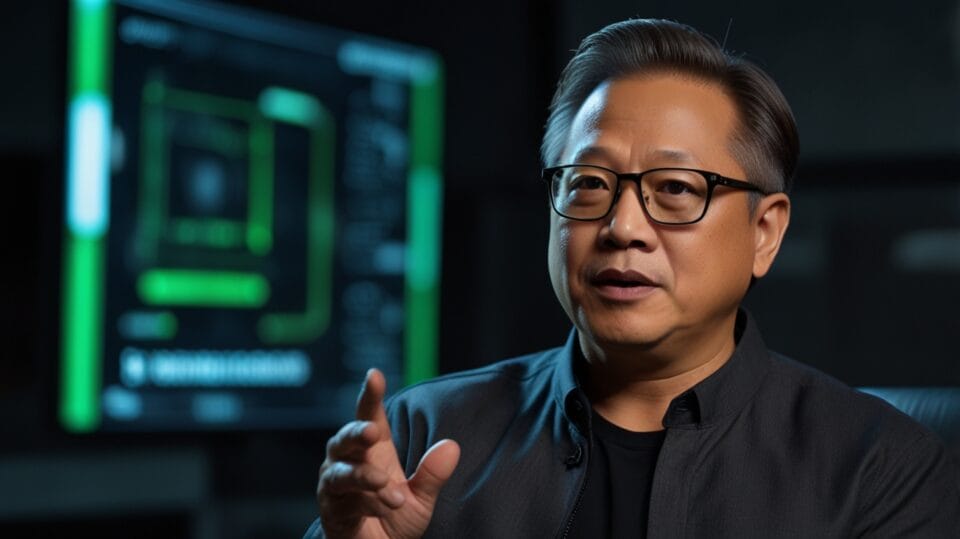
Nvidia’s CEO, Jensen Huang, recently highlighted the importance of artificial intelligence (AI) in India’s future at the AI summit held in Mumbai from 23-25 October.
India is set to play a pivotal role in the global AI and IT revolution and become an epicentre of these developments. Huang mulled over the paradigm shifts that the world has witnessed in computing, comparing those changes to the revolutionary changes brought forth by IBM during the 1960s. He highlighted that AI is restructuring every aspect of technology and India is at the centre of this innovation.
(Source: NVIDIA)
Nvidia also announced the release of the Blackwell B200 GPUs in the fourth quarter of 2024. It will be the successor product to the Hopper and Ada Lovelace microarchitectures.
Let us scrutinize some of the major points that Huang brought forth in the discussions.
Nvidia’s India Goals and their Synergies with Global Goals :
Huang said that Nvidia will focus on building an AI infrastructure by forging partnerships with key Indian industry players (Tata, Reliance, Flipkart). These partnerships will help Nvidia build both local and global solutions. One of the key cornerstones of this strategy will be the development of linguistic-centric large language models(LLMs). CEO Huang believes that the success of LLMs in India is bound to translate in other parts of the world.
Huang underscored the point of assigning importance to the obsolescence of Moore’s Law. AI is going to play a key role in offsetting the diminishing effect of Moore’s Law. Moore’s Law states that the number of transistors in an integrated circuit doubles roughly every two years. It means that the hardware technological depreciation is gradually slowing down. This is where Generative AI will play a key role in facilitating software-propelled technological growth.
Developments in Generative AI that are currently the future of Business and Technology:
Generative AI will impact many industries. Nvidia’s Compute Unified Device Architecture(CUDA), a parallel computing platform has already been implemented in industries like Manufacturing, Semiconductors and Computation. Firms are heavily investing in Generative AI to create specialized AI agents that are meant to handle end-to-end tasks. These supposedly AI agents or chatbots are capable of accelerating employee productivity leading to the creation of “super employees”. Generative AI is being used to create large language models(LLMs). Nvidia, for example, is investing heavily in Hindi-based LLM in India with local start-ups. The underlying logic towards investing and partnering in the Indian ecosystem is in the vast linguistic diversity spanning it. If LLMs are successfully developed and made for India, they can be built anywhere in the world.
What might unfold with the development of Blackwell GPUs and Agentic AI models in India?
Blackwell GPUs set to hit the market in Q4 2024, have the potential to alter the Indian AI ecosystem. India will witness its fair share of benefits and challenges with such a development.
Blackwell GPUs will accelerate the AI workflows and enable faster development and deployment of AI solutions in India in Finance, Manufacturing and Health, driving efficiency and innovation. Nvidia’s strong AI infrastructure in India along with the roll-out of the new GPU will further strengthen the existing infrastructure. The agentic AI models capable of carrying out complex end-to-end tasks will usher in a new era of “Super Employees” who will propel workforce efficiency in India. Beyond workforce efficiency, Nvidia’s investment in localized LLMs will make tailored AI-driven services more accessible to the common populace.
However, the giant strides don’t come without its fair share of challenges. The depreciation of technology practically ceasing, will make accessibility to tools like Blackwell GPU more expensive. So the wider adoption by small businesses and start-ups will be a challenge. While agentic AI models can empower some, it will displace a lot of jobs. Hence it becomes imperative to address questions about upskilling, reskilling and the transition of the workforce from ‘Traditional’ to ‘Super’ employees. Data Privacy and Governance is also something that needs special attention. The use of LLMs and Agentic AI models must accentuate the development of robust data protection frameworks and guidelines for AI development and deployment.
While Nvidia’s India-specific strategy holds immense potential to drive technological transformation, it becomes more imperative to ensure inclusive adoption.






